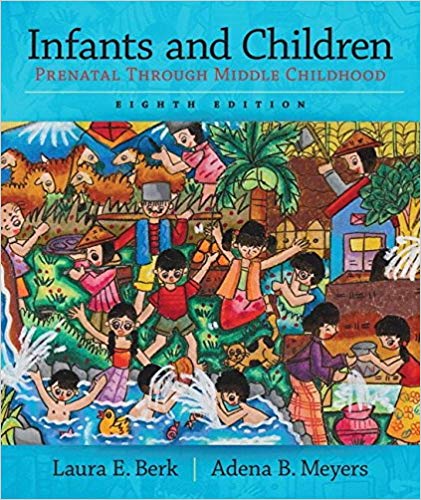Test Bank For Infants and Children Prenatal through Middle Childhood 8th Edition
Digital item No Waiting Time Instant DownloadISBN-13: 9780134167626
In Stock
Original price was: $100.00.$20.00Current price is: $20.00.
Test Bank For Infants and Children Prenatal through Middle Childhood 8th Edition
CHAPTER 1HISTORY, THEORY, AND RESEARCH STRATEGIESMULTIPLE CHOICE
- 1) The central questions addressed by the field of child development
- A) are primarily of scientific interest.
- B) have applied, or practical, importance.
- C) are based exclusively on research conducted by psychologists.
- D) involve all changes a person experiences throughout the lifespan.
Answer: BPage Ref: 4 Skill: Remember Objective: 1.1
- 2) Which of the following statements regarding the major domains of development is true?
- A) The domains of development are separate and distinct.
- B) Each period of development is made up of a new set of domains.
- C) The physical domain has little influence on the other domains.
- D) Development is divided into three broad domains.
Answer: D Page Ref: 5 Skill: RememberObjective: 1.2
- 3) During which period of development does a sense of morality become evident?
- A) infancy and toddlerhood
- B) early childhood
- C) middle childhood
- D) adolescence
Answer: BPage Ref: 6 Skill: Remember Objective: 1.2
- 4) Which of the following statements about emerging adulthood is true?
- A) It is a period of development that spans from age 15 to 21 years.
- B) It is a period of development unique to underdeveloped nations.
- C) Although emerging adults have moved beyond adolescence, they have not yet fully assumed adult roles.
- D) It is a period of development mostly limited to young people in developing nations.
Answer: CPage Ref: 6 Skill: Remember Objective: 1.2
- 5) Theories are vital tools because theyA) provide organizing frameworks for our observations of children.
- B) provide the ultimate truth about child development.
- C) do not require scientific verification.
D) are resistant to the influence of cultural values and belief systems.Answer: APage Ref: 7Skill: Understand Objective: 1.3
- 6) In what important way do theories differ from mere opinion or belief? A) They are influenced by cultural values.
- B) They depend on scientific verification.
- C) They explain all aspects of development.
D) They cannot be tested using research procedures. Answer: BPage Ref: 7Skill: UnderstandObjective: 1.3
- 7) Reid believes that the difference between the immature and the mature being is simply one of amount or complexity. Reid views development asA) discontinuous.
B) determined by nature. C) continuous.D) determined by nurture.Answer: CPage Ref: 7–8 Skill: Apply Objective: 1.3
- 8) Jessica believes that development takes place in stages where children change rapidly as they step up to a new level and then change very little for a while. Jessica views development asA) discontinuous.B) determined by nature. C) continuous.D) determined by nurture.Answer: APage Ref: 8 Skill: Apply Objective: 1.3
- 9) In stage theories, development is A) a smooth, continuous process.
- B) gradual and ongoing.
- C) like climbing a staircase.
D) a gradual addition of the same types of skills.Answer: CPage Ref: 8Skill: Understand Objective: 1.3
- 10) In her research, Dr. Rosenblum explores why shy children develop differently from their outgoing agemates. Dr. Rosenblum most likely emphasizes __________ in her research.A) the role of distinct contextsB) the nature–nurture controversy C) theconceptofstageD) continuous developmentAnswer: APage Ref: 8 Skill: Apply Objective: 1.3


Reviews
There are no reviews yet.